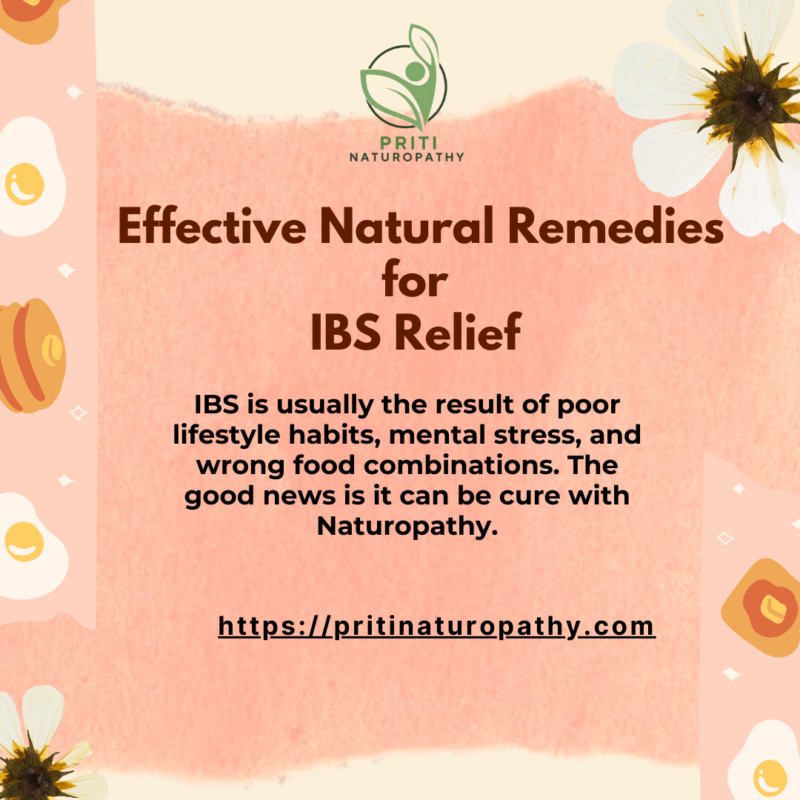Introduction
Irritable Bowel Syndrome (IBS) is a common stomach-related problem that affects many people today. It is not a serious disease, but it creates a lot of discomfort. People with IBS often suffer from gas, stomach pain, irregular bowel movements, bloating, and a feeling of heaviness in the abdomen.
Among the gastrointestinal problems IBS i.e. irritable bowel syndrome is the most commonly occurring disease sometimes we are not able to diagnose the disease. In this disease the food is although digested but the differential absorption of glucose, calcium does not occur due to which the patient is weak, lack of blood, weak bones and also weak muscles.
Due to poor digestion lot of semi digested food, the stool of such person is frothy, greasy, foul smell and the frequency also increases.
In naturopathy, we don’t just treat symptoms—we focus on the root cause. IBS is usually the result of poor lifestyle habits, mental stress, and wrong food combinations. The good news is it can be managed naturally through simple changes in diet, yoga, and daily routine. In this article, I’ll share how you can take care of IBS using nature cure methods.
Symptoms
IBS symptoms may vary from person to person, but some common signs are:
- Frequent urge to pass stool
- Painful or difficult defecation (sometimes needing effort or help)
- Constipation for 2–3 days followed by loose motion
- Stomach pain that doesn’t go easily
- White mucus-like substance in stool
- Small, hard stools like small balls
- Loud bowel sounds, bloating, or heaviness
- Feeling full even after small meals
- Irritability, anxiety, or mood changes due to discomfort
If these symptoms are regular in your life, it’s time to take action gently and naturally.
Causes
IBS is not caused by one single thing. It develops slowly due to unhealthy habits and stressful living. Here are some common causes:
- Eating too frequently or at odd times
- Consuming spicy, oily, or fried food regularly
- Low fiber in the diet (not eating enough fruits and vegetables)
- Eating in a hurry or while watching screens
- Going to sleep immediately after dinner
- Mental stress, anxiety, and tension
- Irregular sleep pattern
- Lack of physical activity
Your stomach is connected to your mind. A busy, worried mind can disturb digestion and bowel movements.
Natural Treatment
In naturopathy, we treat IBS through diet correction, yoga, and Ayurveda. Let’s look at each one.
1. Diet
Food plays a very important role in treating IBS. Choose foods that are easy to digest and rich in fibre.
What to eat:
- Fruits like papaya, guava, pear, orange, bael, and mausambi
- Vegetables like carrot, cabbage, cucumber, radish, bottle gourd (lauki), etc.
- Buttermilk with roasted jeera (after meals)
- Whole grain chapatis with bran
- Lemon water with honey in the morning
- Warm water throughout the day
Tips:
- Chew your food slowly and mindfully
- Eat at regular timings
- Avoid overeating
- Take early dinner (before 8 pm)
These small changes help improve digestion and bowel movement.
2. Yoga
Yoga helps strengthen the digestive system and calm the nervous system.
Useful Yoga Asanas:
- Pavanmuktasana (wind-relieving pose)
- Vajrasana (especially after meals)
- Ardha Matsyendrasana (spinal twist)
- Bhujangasana (cobra pose)
- Simple stretching for the abdomen
Other tips:
- Practice deep breathing (Pranayama) daily
- Go for a morning walk in fresh air
- After meals, lie down on the left side for 10 minutes
Yoga and breathing improve blood circulation in the intestines and help reduce gas and pain.
3. Ayurveda and Naturopathy Treatments
Some nature cure treatments can be done at home regularly:
- Mud pack on the stomach for 30 minutes
- Buttermilk enema (once or twice a week)
- Castor oil enema to remove sticky stools
- Hot and cold hip bath (alternating 3–5 mins)
- Cold and hot sponging on the abdomen in the morning
- Stomach massage with light pressure
- Sitz bath in lukewarm water for 10–15 minutes
- Shankh Prakshalana (under expert guidance only)
These therapies help cleanse the colon and improve absorption of nutrients.
Things to Avoid
If you are suffering from IBS, there are certain foods and habits you should strictly avoid:
- Milk and milk products (they increase acidity)
- Fried, oily, spicy food
- Refined flour, white bread, and bakery items
- Cold drinks, packed juices, tea, coffee
- Preserved, processed, or canned food
- Chocolate and sweets with artificial ingredients
- Eating late at night or skipping meals
- Excessive screen time while eating
Also, avoid worrying too much. Stress directly affects your gut. Learn to relax and give your mind peace.
Summary
IBS can be effectively managed through natural remedies; by making small changes in food, following yoga, and practicing simple naturopathy treatments, you can improve your digestion. Heavy medicines never solve any problem permanently—just listen to your body, food and lifestyle changes can do miracles.
My Opinion
As a Naturopathy consultant, I’ve seen many people get relief from IBS without any medicine. Nature has given us everything—fruits, herbs, yoga, and self-discipline. The key is to be consistent and gentle with your body. Don’t ignore your digestion. Your gut is your second brain. When your stomach is happy, your mood and health automatically improve.
If you are suffering from IBS and want personal guidance, feel free to book a free consultation with me.
I will help you with a customized plan including diet, yoga, herbs, and lifestyle correction.
Stay well, stay natural.
FAQS
Q- Can IBS be cured completely with naturopathy?
Yes, IBS can cure completely with the right diet, yoga, lifestyle and naturopathy.
Q- What is the best diet for IBS relief at home?
A fiber-rich, simple diet gives you IBS relief, include fresh fruits like papaya, guava, mausambi, and vegetables like bottle gourd, carrot, and cabbage in your diet.
Q- Can stress cause IBS symptoms to worsen?
Most of the time IBS linked to anxiety and overthinking, that’s why yoga, pranayama, and nature walks are suggested when a person is suffering from the IBS.
Q- Which yoga asanas are best for IBS?
Pavanmuktasana, Vajrasana, Bhujangasana, and Ardha Matsyendrasana are very helpful. Some breathing exercises are also helpful.
Q- What are common symptoms of IBS?
Common symptoms:
- Frequent urge to pass stool
- Painful or difficult defecation (sometimes needing effort or help)
- Constipation for 2–3 days followed by loose motion
- Stomach pain that doesn’t go easily
- White mucus-like substance in stool
- Small, hard stools like small balls
- Loud bowel sounds, bloating, or heaviness
- Feeling full even after small meals
- Irritability, anxiety, or mood changes due to discomfort
Q- What foods should be avoided with IBS?
If you are suffering from IBS, there are certain foods you should strictly avoid:
- Milk and milk products (they increase acidity)
- Fried, oily, spicy food
- Refined flour, white bread, and bakery items
- Cold drinks, packed juices, tea, coffee
- Preserved, processed, or canned food
- Chocolate and sweets with artificial ingredients


Leave a Reply